SCOTUS Restricts Rulemaking
Air Date: Week of July 5, 2024
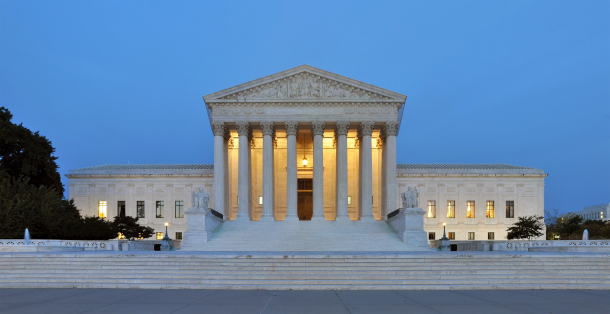
On June 28, 2024, the U.S. Supreme Court struck down a decades-old Chevron Deference Doctrine that had mandated federal courts to accept reasonable agency interpretations of unclear laws. (Photo: Joe Ravi, Wikimedia Commons, CC BY-SA 3.0)
In a 6-3 decision the US Supreme Court struck down the longstanding Chevron deference doctrine, which allowed federal agencies to make rules relying on unclear statutes, provided their interpretation was reasonable. Law professor and former EPA Regional Counsel Pat Parenteau joins Host Aynsley O’Neill to parse the potentially disastrous consequences of this decision for environmental and other public protection regulations and what agencies and lawyers will need to do to have a fighting chance in court.
Transcript
DOERING: From PRX and the Jennifer and Ted Stanley Studios at the University of Massachusetts Boston, this is Living on Earth. I’m Jenni Doering.
O’NEILL: And I’m Aynsley O’Neill.
After the November general election, it’s possible the White House will change hands, but federal judges are appointed for life. And the six justices who are on the Supreme Court thanks to Republican presidents are overturning decades of precedent on abortion, presidential power, and environmental law. With one of the last decisions released this term, the Court struck down the Chevron deference doctrine, significantly curtailing the power of federal agencies to interpret the laws that they regulate. In two cases known as Loper and Relentless, fishing companies challenged a rule by the National Marine Fisheries Service, arguing that they should not have to pay for the federal monitors that may be assigned to observe their fishing vessels. But there are far broader implications of overturning the Chevron doctrine than for just a fishing company or two. For more, we turn now to Pat Parenteau, former EPA regional counsel and emeritus professor at Vermont Law and Graduate School. Welcome back to Living on Earth, Pat!
PARENTEAU: Thanks. Aynsley, good to be with you,
O'NEILL: Pat, please walk us through the history of this Chevron deference case.
PARENTEAU: Sure. So, this is a 40 year old precedent. In a decision by the Supreme Court in 1984. Chevron vs. Natural Resources Defense Council is the technical name of the case. It held that when an agency is interpreting a statute, and the language of the statute is unclear or ambiguous, that so long as the agency's interpretation is reasonable, it must be upheld. So we call this the Chevron deference doctrine. It has been cited 19,000 times over the 40 year history of this doctrine. So as Justice Kagan said in her dissent, in this case, we're going to be discussing, this has become a cornerstone of administrative law. It isn't just EPA rules. It's all the rules of the federal government are governed by this standard that we've had. And now as we'll discuss the new world that we're facing, because the Supreme Court has overturned the chevron decision.
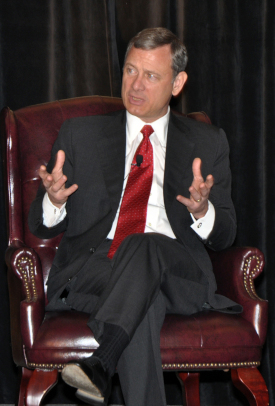
“Chevron is overruled. Courts must exercise their independent judgment in deciding whether an agency has acted within its statutory authority,” said Chief Justice John Roberts during the ruling. (Photo: J.Marca Executive, Flickr, Public Domain)
O'NEILL: And now, it was overruled in a 6-3 split. Why is that? What arguments did the justices give in that ruling?
PARENTEAU: So Chief Justice Roberts wrote the majority opinion, yes, it was 6 to 3. So it was another one of these partisan splits that we've become familiar with on the Supreme Court with six Republican appointed justices agreeing and the three democratically appointed justices, sometimes referred to as the liberal wing of the court, in dissent. Chief Justice Roberts basically said the Chevron decision was wrong from the beginning. And it hasn't been workable, at least in his view. And it was wrong he said, because another statute, the Administrative Procedure Act, which sort of governs the way agencies operate, and it also governs the way courts review agency decisions. Chief Justice Roberts' view, the APA was a clear command, that the courts must always be the ones to decide what the law means, even though agencies have a lot of expertise, obviously, scientific expertise, technological expertise, policy judgment. Even though many of these questions contain a rich mixture of fact, and policy and science and so forth. In the end, said, Chief Justice Roberts, it's always going to come down to a legal question. And only the courts should be deciding what the answer to those legal questions would be.

The ruling significantly reduces the authority of the Environmental Protection Agency (EPA) among other federal agencies to interpret and implement the laws they are charged with enforcing. [Note: The above picture is from EPA Union rallies in 2018]. (Photo: AFGE, Flickr, CC BY 2.0)
O'NEILL: Who have been the stakeholders involved throughout this SCOTUS case?
PARENTEAU: Yes. So in the case that was just decided, it's called Loper and a companion case, which goes by the name of Relentless. The point is, this particular case dealt with the fishing industry. So when you ask who the players are, it's typically an industry group that is subject to a regulation they don't like and they want thrown out. Sometimes it's the mining industry, sometimes it's the fossil fuel industry, could be any number of other industries could be landowners could be real estate developers. The point is these are all interests who have been subject to regulations, which they find opposition to. And now what we see is that those economic interests have been joined by Republicans, attorneys general, Republican governors, and it sounds partisan, but that's because it is partisan. The Republican governed states have uniformly challenged the Biden administration, and before that the Obama administration and have been trying to get the Supreme Court to rule that these agencies adopting these regulations they find objectionable, shouldn't get deference. And so they have now finally succeeded in that mission.
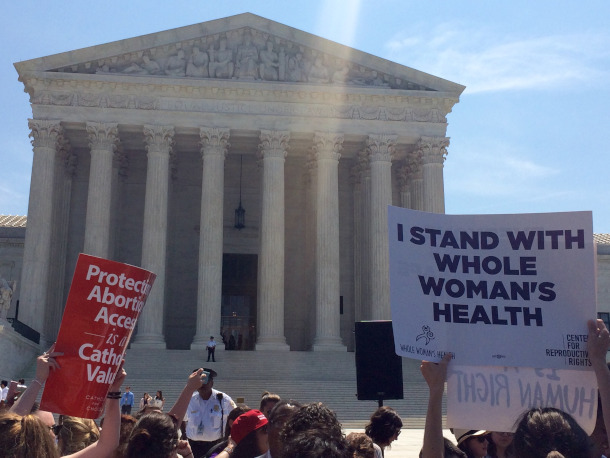
A moment of public demonstration on abortion rights in front of the Supreme Court leading up to the 2022 Dobbs decision overturning Roe v. Wade. (Photo: Mark Waner, Flickr, CC BY 2.0)
O'NEILL: And what do you expect are going to be some of the acts or laws that are going to be challenged now that the Chevron Doctrine has been overturned?
PARENTEAU: Honestly, everything is going to be subject to challenge. We're seeing virtually every rule that the Biden administration has adopted, clean air, clean water, climate change, endangered species, National Environmental Policy Act, all of them have been challenged. And so this opinion from the Supreme Court is going to greatly strengthen the arguments of people challenging these rules: protecting public health, protecting endangered species, whatever they might be attempting to do. And it's not clear that the opponents to these rules are going to win every single time. But their arguments have been greatly strengthened when the Supreme Court has basically said, it's up to all of the individual judges out there. And there are more than 500 Federal Court judges in the United States. So, it's a large number over 200 were appointed by former President Trump. So you know, they're very conservative. And so you have a mix of judges in the lower courts that are now charged with interpreting statutes in a way that they haven't for 40 years. So that's going to create some chaos. Chief Justice Roberts tried to make the case that his decision was going to bring some predictability and some stability to interpretations of statutes. I don't think that's right. You know, we heard the same thing when the Supreme Court overturned Roe versus Wade, that that was going to be the end of the Supreme Court getting into the abortion debate, right. And look where we are today. More and more cases are coming up. So this business of saying we're going to overturn a long standing precedent, and we will clarify the law simply hasn't borne out. So what I think is going to happen is you're going to see conflict, in the ways that the lower courts are trying to figure out what their new responsibility is. It used to be, as long as the agency had prepared a complete, rigorous, even administrative record to support their decision. And as long as the Court said, even though there's more than one way to interpret this law, the way that you've interpreted it is reasonable. It isn't arbitrary. People can differ. But somebody's got to decide. So what all of these cases come down to is that question, who decides when a law isn't crystal clear.
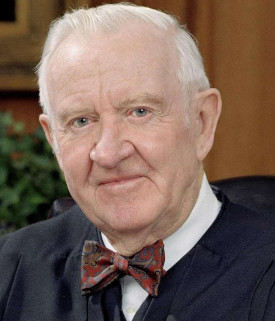
The author of the Chevron Deference ruling that The Supreme Court recently overturned, John Paul Stevens, died on July 16th, 2019. The Chevron Doctrine has been cited 19,000 times over its 40-year history. (Photo: Steve Petteway, Collection of the Supreme Court of the United States, public domain)
And I don't have to tell you that laws typically are not always crystal clear. When Congress adopts a law, it doesn't adopt a vague statute on purpose. But sometimes, in order to get something passed, you have to compromise.Which means sometimes the language of a law is left a little bit vague to allow the expert agencies, EPA and others to basically figure out how do we do what Congress has ordered us to do? How do we protect public health? How do we keep the air clean, the water clean, and so forth? And so Congress has in for a long time now been delegating this broader authority to agencies and relying on the agencies to figure out what's the most sensible way to achieve the statutory purposes. This new regime that we've been given with the Loper decision overruling Chevron is no judges are not necessarily going to be persuaded by what the agencies have done. Even if it looks reasonable. That's not enough anymore, for it to be reasonable.
O'NEILL: With such broad implications, what are the options that people are looking into when it comes to challenging this recent decision?
PARENTEAU: Yeah, we have to accept the fact that this is the law of the land, right? So those of us that are concerned about the environment and public health and climate and all the rest, are going to have to figure out how to deal with it. And here's some ideas: Number 1, when the court says that they're no longer going to give deference to agencies interpretation: that cuts both ways, doesn't it? So if there's a second Trump administration, we know what we're going to see, we're going to see another rollback of all the environmental rules that the Biden administration has been adopting. So then the question is, there'll be people challenging those rules. And, so this decision is going to mean, those attempts to roll back rules that are on the books by coming up with a new interpretation of the governing law. They're not entitled to deference either. So I'm not as optimistic about how that's going to work out. But certainly the argument is going to be there. There's a saying that we use in the law "What's sauce for the goose is sauce for the gander."
The Supreme Court decision to overturn the #ChevronDoctrine could present challenges for implementing and enforcing laws that support nature. We will continue to work at all levels of government to protect people and our planet. https://t.co/b4V8md9STA
— The Nature Conservancy (@nature_org) June 28, 2024
And what that basically means is, if we the environmental proponents of certain rules don't deserve deference, or those rules don't deserve deference, then the same is true of rules that are trying to deregulate. The other thing I'll say is that there are some things in Chief Justice Roberts opinion that we can use to defend the rules that we want to see upheld. He makes a point in referring to an earlier Supreme Court decision, which we call the Skidmore decision. And this decision also deals with when do agencies deserve deference when they're interpreting a statute. And the way this works is Skidmore deference, as we call it, as opposed to Chevron deference which is automatic. It relies on the ability of the agency to basically persuade the court that its interpretation is, quote, “the best reading of the text of the statute”. Looking at the structure of the statute, the purpose, the history, has the agency come up with an interpretation, which the court can accept, as quote "the best reading”. So I think agencies, lawyers, and environmental lawyers in general that want to see these rules upheld, are going to have to work harder at establishing through the administrative record that supports these rules through the rulemaking process itself. And through the way that they explain the basis in the statute for the rule, and go through very carefully how they've looked at every single factor that should be looked at and how they've explained clearly the choices that they made, based on the information that they have, using the best available science and so forth, right. So I think there's hope that if we do a really good job of building a case and a record to support interpretations that further environmental law, at least we’ll have a fighting chance to prevail when we're in court.
O'NEILL: Pat, you've been working in this sphere for a very long time at this point. Now, what do you make of a decision like this?
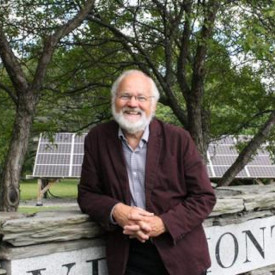
Pat Parenteau is emeritus professor of law at Vermont Law and Graduate School and formerly served as EPA Regional Counsel. (Photo: Courtesy of Vermont Law and Graduate School)
PARENTEAU: Somebody like myself has been doing this for over 50 years, it's soul crushing. You're watching your life's work get trashed for reasons that don't make sense. It's not as if environmental regulation has caused economic harm. Quite the contrary. All the studies show that environmental regulations create more economic benefit than they do economic costs, the benefits of these regulations, whether they're health or environmental quality, and be able to drink your water and know that somebody's paying attention to what's in that water. And over the course of my career, what I've seen is environmental law doing what it was intended to do, which was make life better, make the quality of people's communities better. And to see that taken apart piece by piece is awfully difficult. But you know, keep trying. There's no really alternative. You can't quit. There's no quitting in this kind of a challenge. You just have to find ways of making progress wherever you can, keep making the arguments, keep doing the research, keep advancing the right values, and try to galvanize people so that they don't just accept what's happening as inevitable. Because it isn't inevitable. We still do as a nation, as a body politic, we still do control our own destiny, but only if we take responsibility and act on it.
O'NEILL: Pat Parenteau is former EPA Regional Council and Emeritus professor at Vermont Law and Graduate school. Thank you, as always, Pat for joining us.
PARENTEAU: Thanks, Aynsley.
Links
Living on Earth wants to hear from you!
Living on Earth
62 Calef Highway, Suite 212
Lee, NH 03861
Telephone: 617-287-4121
E-mail: comments@loe.org
Newsletter [Click here]
Donate to Living on Earth!
Living on Earth is an independent media program and relies entirely on contributions from listeners and institutions supporting public service. Please donate now to preserve an independent environmental voice.
NewsletterLiving on Earth offers a weekly delivery of the show's rundown to your mailbox. Sign up for our newsletter today!
 Sailors For The Sea: Be the change you want to sea.
Sailors For The Sea: Be the change you want to sea.
 The Grantham Foundation for the Protection of the Environment: Committed to protecting and improving the health of the global environment.
The Grantham Foundation for the Protection of the Environment: Committed to protecting and improving the health of the global environment.
 Contribute to Living on Earth and receive, as our gift to you, an archival print of one of Mark Seth Lender's extraordinary wildlife photographs. Follow the link to see Mark's current collection of photographs.
Contribute to Living on Earth and receive, as our gift to you, an archival print of one of Mark Seth Lender's extraordinary wildlife photographs. Follow the link to see Mark's current collection of photographs.
 Buy a signed copy of Mark Seth Lender's book Smeagull the Seagull & support Living on Earth
Buy a signed copy of Mark Seth Lender's book Smeagull the Seagull & support Living on Earth

